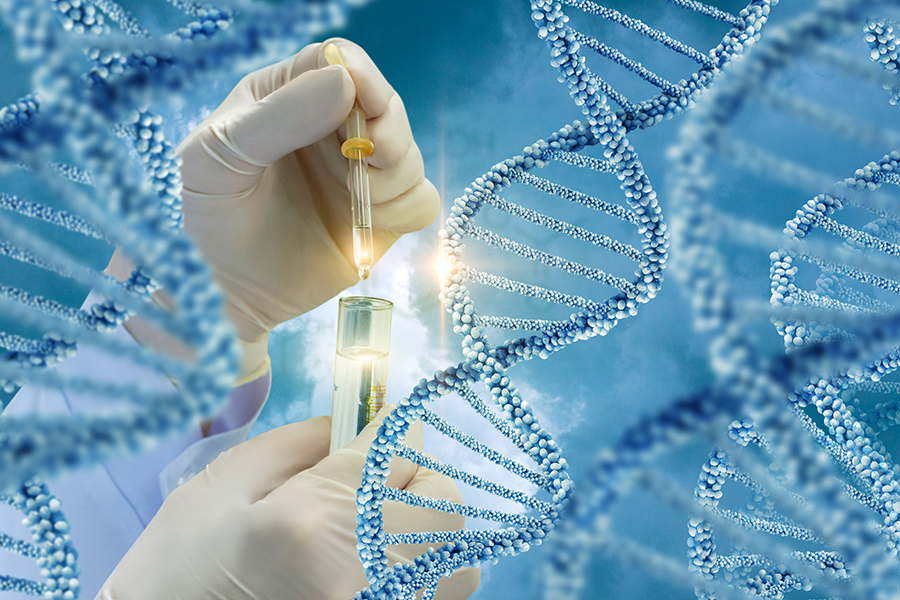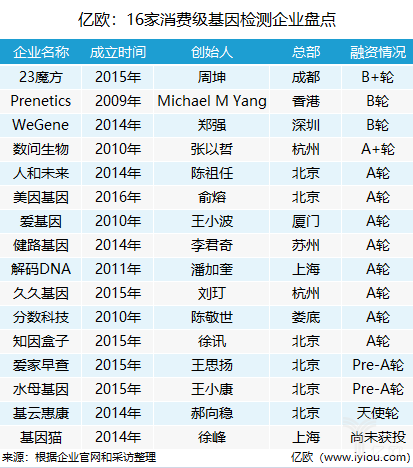
Image courtesy of "123rf"
In recent years, consumer-grade genetic testing, such as ancestral analysis, genetic risk assessment, and alcohol metabolism, has continued to enter the field of vision. Before discussing consumer-level genetic testing, we should understand that genetic testing is divided into two major categories, one is scientific and medical- related professional-level genetic testing; the other is consumer-grade genetic testing.
Generally speaking, consumer-level genetic testing is directly aimed at the general audience. Users can purchase the order via the Internet or APP. After receiving the sample box, the oral test strip or saliva is placed in a special test tube and sent back to the laboratory. After a few weeks, genetic analysis results including health risks, nutritional metabolism, genetic diseases, drug guidelines, genetic characteristics, etc., can be obtained without the participation of medical personnel.
In the United States, the United States started early in consumer-level genetic testing. Ten years ago, the United States had already produced consumer-grade genetic testing products for the general public. More representative consumer genetic testing companies include 23andMe, Ancestry, Helix and Human Longevity.
In 2013, consumer-grade genetic testing companies began to “land†in China and have continued to thrive since then. According to incomplete statistics, China now has more than 200 consumer-grade genetic testing companies. Even so, there is still much room for development in the field of consumer-grade genetic testing in China. According to Zhou Kun, founder and CEO of 23 Rubik's Cube, in China, the total number of individual users participating in consumer-grade genetic testing and owning their own data in 2016 was about 100,000, and in 2017 it was about 300,000. At present, the population penetration rate of China's consumer genetic testing services is 0.03%. He judged that this number will reach 3.5% in the next five years, which means that in 2022, 50 million people in China will have their own genomic data.
Although consumer-grade genetic testing is diverse, the four types of tumor susceptibility genes, chronic disease genetic diseases genes, prenatal and maternal and infant diagnosis, and various types of shallow-type tests including nutrient metabolism, beauty and beauty, motor function, and genetic testing are the main types. Detection block. Among them, the detection of tumor susceptibility genes has relatively large development space both on the scale of demand and the willingness of consumers to accept.
Based on this, Yiou Health has taken stock of 16 consumer-level genetic testing companies currently on the market. By taking stock of the development of these companies, to increase readers' understanding of the entire consumer-level genetic testing field.

1, 23 Rubik's Cube
23 Rubik's Cube was founded in 2015, the founder and CEO is Zhou Kun, the headquarters is located in Chengdu, until now the company has received more than 200 million B + round of financing.
23 Rubik's products cover hundreds of projects including ancestral sources, genetic risks, and genetic traits. In the sales channel, the purchase channel of the 23 Rubik's Cube genetic testing products is only open to the users and takes the pure online sales route. Consumers can purchase products in two ways, one is 23 Rubik's self-built platform (official website / WeChat / APP), and the other is external e-commerce channel (Jingdong and Taobao official flagship store).
2, Prenettics
Prenetics was founded in 2009 by Michael M Yang, whose headquarters is based in Hong Kong. In October 2017, it was awarded a $40 million Series B round of financing by Alibaba Entrepreneur Fund and Haikuo Sky Ventures.
Prenetics' products include genetic testing for dietary health, drug reactions, genetic cancer risks, and pre-pregnancy tests.
3, WeGene
WeGene was founded in 2014, the founder and CEO is Zheng Qiang, the headquarters is in Shenzhen, and the B round of financing in 2018.
WeGene's main services include ancestral analysis based on genomic data, personalized exercise and weight loss recommendations, nutritional genomics, and genomic medicine.
4, the number of creatures
Q&B was founded in 2010. The chairman and general manager of the company is Zhang Yizhe. The headquarters is located in Hangzhou. In April 2018, it was funded by the tens of millions of A+ rounds invested by the Yiyi Fund.
The main business of Q&A is divided into four categories: popularization testing, medical testing services, development and production of diagnostic kits and CRO.
5. People and the future
Founded in 2014, Renhe is the founder of Chen Zuren. The headquarters is located in Beijing. In July 2017, he won the 250-yuan A round of financing from Jiawo Capital and Haijie Investment.
People and the future are mainly in the three major sectors of medical diagnosis, smart health management and biomedical big data .
6, the cause gene
The company was founded in 2016, the CEO is Yu Rong, the headquarters is in Beijing, and in October 2016, it won 167 million A round of financing.
Mainin genes are now available in a variety of products including "Meinan" susceptibility gene detection, early colorectal cancer screening, personal genome testing and sports nutrition genetic testing.
7, love gene
Ai Gene was founded in 2010. The founder and CEO is Wang Xiaobo. The headquarters is located in Xiamen. In June 2016, it was awarded tens of millions of A-round financing by Galaxy Capital.
The main business of Love Gene is genetic testing, which covers high-risk diseases such as cancer and chronic diseases. It also has special medical examinations for bad genes for individuals and their families, such as children's talents, maternal health care, and cosmetic shaping.
8, Jianlu gene
Jianlu Gene was established in 2014, the chairman of the board is Li Junqi, the headquarters is located in Suzhou, and in June 2015, it was awarded a multi-funded A round of financing by the starting point of the venture capital.
The main business areas of Jianlu Gene include cancer risk health management, major chronic disease health management and disease health management.
9, decoding DNA
Decoded DNA was founded in 2011. The founder is Pan Jiakui. The headquarters is located in Shanghai. In April 2016, it was awarded the tens of millions of A-round financing by Haihui Investment and Ping An Innovation Investment Fund.
Decoding DNA services include non-invasive genetic testing for women and children, molecular diagnostics for liver diseases, and molecular diagnostics for tumors. In addition, there are susceptibility gene detection programs including life decoding, as well as high-end personal genome-wide sequencing services.
10. Long-lasting genes
Jiujiu Gene was founded in 2015, the founder is Liu Wei, the headquarters is located in Hangzhou, and in July 2017, it was awarded the A round of financing.
For a long time, Gene currently provides two types of products: whole-genome detection and single-test. The single-test includes skin, sports, slimming, and child nutrition. At the same time, the gene has laid out the consumer market of the back-end life for a long time, and provides consumers with life-long and sustainable services by means of consumption guides and dietary advice.
11, score technology
Fraction Technology was established in 2010, the chairman of the board is Chen Jingshi, the headquarters is located in Wuyuan, and in September 2017, it was invested by Hengyoutai in the A round of financing of 100 million yuan or more.
Fractional Technology is committed to creating a nine-in-one platform covering the Internet cloud platform, genome-wide, nutritional genomics, pharmacogenomics, immunohistochemistry, human intestinal micro-ecology, nine medical constitutions of Chinese medicine, mental health and routine physical examination. "The whole life cycle of accurate health management big data cloud platform.
12, Zhiyin box
Zhiyin Box was established in 2015, the chairman of the board is Xuxun, the headquarters is located in Beijing, and in May 2017, it was awarded RMB 50 million A round of financing by Shenzhen Huada Research and Development Co., Ltd. and Yanshang Investment.
Zhiyin Box is committed to providing each customer with personalized, one-stop and sustainable personal precision health management services through mobile internet technology to create an ecosystem of genetic industry and precise health management.
13, love home early check
Aijia early investigation was established in 2015. The founder and CEO is Wang Siyang. The headquarters is located in Beijing. In 2016, it received millions of Pre-A rounds of financing.
Aijia has checked 12 services, including anti-cancer health consultation, information, cancer risk assessment, online health private courses, private precision tumor screening program customization, private report interpretation and lifestyle guidance, private precision nutrition prescription, private Precise exercise anti-cancer health prescription, (domestic and international) referral, consultation, consultation, and offline health salon.
14, jellyfish gene
Jellyfish gene was established in 2015, the CEO is Wang Xiaokang, the headquarters is in Beijing, and in January 2018, Yixin invested tens of millions of yuan in round A financing.
Jellyfish genes now have "Life Coach Personal Genetic Testing", "Life Map Zhizuyuan + Healthy Personal Genetic Testing", "Smell Stinking Infant Intestinal Flora Maturity Monitoring", "Enterprise-Grade Genetic Testing Platform", "Lighthouse" The five core products of the private health management service provide genetic testing and personalized health guidance to meet different populations.
15. Jiyun Wellcome
Founded in 2014, Jiyun Wellcome is the founder and CEO of Hao Xiangwen. The headquarters is located in Beijing. In 2015, it was funded by millions of angels.
Kiyun Wellcom focuses on human genome big data analysis and develops health applications based on DNA information. Kiyun Wellcom conducts human genome analysis and human exome analysis, and provides professional interpretation, scientific prevention, intelligent guidance, mass storage, efficient computing, multiple protection and other services.
16, genetic cat
Gene cat was founded in 2014, the CEO is Xu Feng, and the headquarters is located in Shanghai.
The gene cat is a genetic testing and personal health guidance service platform. The IME intelligent drug screening system provides a treatment plan for the drug model of the autologous cancer cell metabolic pathway of tumor patients, aiming at starting from the gene and using the mobile Internet as a platform to study and Solve a series of problems brought about by sub-health conditions.
As people's consumption levels continue to increase, many consumer-grade genetic testing companies have quickly entered people's field of vision. It seems that the consumer-grade genetic testing spring is coming, but the facts are not as good as imagined. At present, there are still many problems in consumer-level genetic testing, such as: opaque pricing, uneven project quality, and poor professional interpretation of genetic testing results. Where will the future consumer-grade genetic testing go? Perhaps starting from the products and services themselves, it is king to strive for products and services.
Optics,Blank Glass,Glass Blanks For Crafts,Glass Ornament Blanks
Shandong Freedoms Technology Co.,Ltd , https://www.sdfreedomtech.com